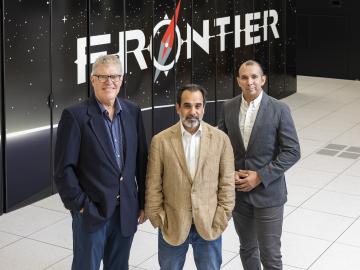
Filter News
Area of Research
- Advanced Manufacturing (2)
- Biology and Environment (20)
- Building Technologies (1)
- Computational Biology (1)
- Computational Engineering (2)
- Computer Science (4)
- Energy Science (33)
- Fusion and Fission (2)
- Isotopes (3)
- Materials (6)
- Materials for Computing (8)
- Mathematics (1)
- National Security (2)
- Neutron Science (6)
- Quantum information Science (2)
- Supercomputing (19)
News Topics
- (-) Big Data (33)
- (-) Bioenergy (29)
- (-) Biomedical (23)
- (-) Composites (17)
- (-) Computer Science (76)
- (-) Energy Storage (36)
- (-) Microscopy (14)
- (-) Summit (23)
- 3-D Printing/Advanced Manufacturing (56)
- Advanced Reactors (7)
- Artificial Intelligence (52)
- Biology (45)
- Biotechnology (15)
- Buildings (42)
- Chemical Sciences (37)
- Clean Water (14)
- Coronavirus (10)
- Critical Materials (11)
- Cybersecurity (5)
- Education (2)
- Emergency (3)
- Environment (77)
- Exascale Computing (27)
- Fossil Energy (4)
- Frontier (25)
- Fusion (20)
- Grid (26)
- High-Performance Computing (64)
- Hydropower (1)
- Isotopes (29)
- ITER (6)
- Machine Learning (24)
- Materials (56)
- Materials Science (48)
- Mathematics (8)
- Mercury (3)
- Microelectronics (2)
- Molten Salt (1)
- Nanotechnology (12)
- National Security (41)
- Neutron Science (43)
- Nuclear Energy (21)
- Partnerships (29)
- Physics (12)
- Polymers (10)
- Quantum Computing (25)
- Quantum Science (34)
- Security (11)
- Simulation (24)
- Space Exploration (7)
- Statistics (4)
- Transportation (36)
Media Contacts

A team led by scientists at ORNL identified and demonstrated a method to process a plant-based material called nanocellulose that reduced energy needs by a whopping 21%, using simulations on the lab’s supercomputers and follow-on analysis.

Office of Science to announce a new research and development opportunity led by ORNL to advance technologies and drive new capabilities for future supercomputers. This industry research program worth $23 million, called New Frontiers, will initiate partnerships with multiple companies to accelerate the R&D of critical technologies with renewed emphasis on energy efficiency for the next generation of post-exascale computing in the 2029 and beyond time frame.

ORNL’s Joshua New was named the 2024 Researcher of the Year by R&D World magazine as part of its R&D 100 Professional Award winners.

A study by more than a dozen scientists at the Department of Energy’s Oak Ridge National Laboratory examines potential strategies to integrate quantum computing with the world’s most powerful supercomputing systems in the pursuit of science.

To speed the arrival of the next-generation solid-state batteries that will power electric vehicles and other technologies, scientists led by ORNL advanced the development of flexible, durable sheets of electrolytes. They used a polymer to create a strong yet springy thin film that binds electrolytic particles and at least doubles energy storage.

Jeremiah Sewell leads a team at ORNL, working on xenon-129 production for lung imaging. Reflecting on his career, Sewell views each opportunity as a "door" he steps through, leveraging over 25 years of experience in nuclear power and centrifuge operations to advance the facility’s mission.

Debjani Singh, a senior scientist at ORNL, leads the HydroSource project, which enhances hydropower research by making water data more accessible and useful. With a background in water resources, data science, and earth science, Singh applies innovative tools like AI to advance research. Her career, shaped by her early exposure to science in India, focuses on bridging research with practical applications.

At ORNL, a group of scientists used neutron scattering techniques to investigate a relatively new functional material called a Weyl semimetal. These Weyl fermions move very quickly in a material and can carry electrical charge at room temperature. Scientists think that Weyl semimetals, if used in future electronics, could allow electricity to flow more efficiently and enable more energy-efficient computers and other electronic devices.

Seven entrepreneurs comprise the next cohort of Innovation Crossroads, a DOE Lab-Embedded Entrepreneurship Program node based at ORNL. The program provides energy-related startup founders from across the nation with access to ORNL’s unique scientific resources and capabilities, as well as connect them with experts, mentors and networks to accelerate their efforts to take their world-changing ideas to the marketplace.

Prasanna Balaprakash, director of AI programs at the Department of Energy’s Oak Ridge National Laboratory, has been appointed to Tennessee’s Artificial Intelligence Advisory Council.


